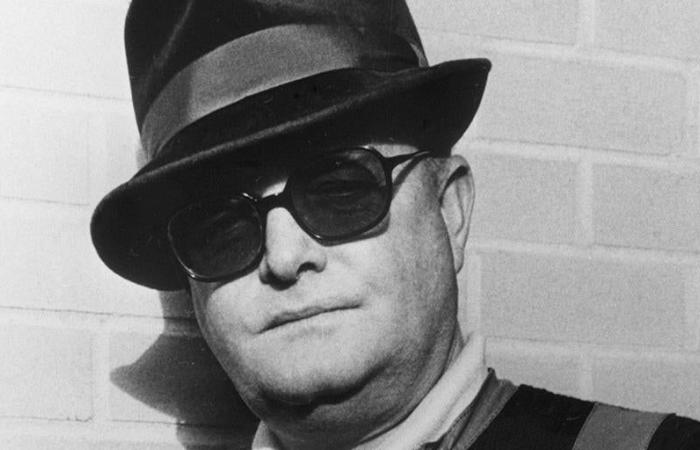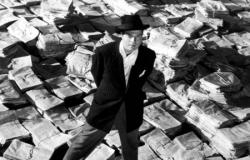In 1956, Truman Capote published in ‘The New Yorker’, in two consecutive numbers, the journey of the American theater company Everyman operates to the Soviet Russia to represent the opera ‘Porgy and Bess’. In the middle of the Cold War, who would publish years later ‘Breakfast in … Tiffany’s’ y ‘In cold blood’the ‘pet’ that ended up stirring against the New York Jet Set, accompanied the African -American opera cast on a trip to the heart of the USSR. It seems an idea too good to be true, and yet it happened.
We read these two reports today in a book, of course, which is the way that the journalism of transcending has. The title of the work is ‘The muses are heard’the publishing house that has rescued it is Big Sur (a recently created seal specialized in non -fiction) and the result is dazzling. ‘The muses are heard’ is also, in some way, a premonition. “Writing it helped me to perfect the tools I would later use in Cold Blood ‘: to turn real facts into a structured narrative,” said Capote.
In cape, this tour becomes a small human comedy. Yes, there are very nice Russians. Very nice people. But they have a bad government, ”they say to each other in the prolegomena of the trip. «I’m dumbfounded, honey. Think about living like this. Always assuming. Without knowing. Seriously, love, where are we going to gossip? Capote, the most acute and gossip of writers, armed with the reporter’s notebook and the novelist’s eye, he feels like a glove the containment to which the style ‘The New Yorker’ forced him.
- Author
Truman Capote - Translation
Sandra Caula - Editorial
Big Sur, 2025 - Number of pages
210 - Precio
17,95 euros
This trip to Russia was the first one that tried an American theatrical group on the other side of civilization, “after many months of complicated and confusing negotiations” with the USSR. It was going to be the last stop of a four -year tour, and the delegation was made up of a hundred people, including actors, orchestra directors, companions, six children, three journalists and a dog. The Comedie Française had acted a year ago, and a few months before he had made a British production with ‘Hamlet’.
«The risks in those cases were only aesthetic. Molière and Shakespeare do not lend themselves to the intentions of modern political propaganda, ”writes Capote. The ‘Porgy and Bess’ was something else. “Here, either of the two sides of the curtain, the American or the Soviet, had a lot to worry about.” View under the “dialectical microscope,” George Gershwin’s opera “turns out to be a bacter tube of the type of bacteria to which the current Russian regime is more allergic.” It was an extremely erotic and fearful work of God. «If this were not quite anatema, they also sing out loud that people can be happy ‘Plenty of Nothin’ [con nada]a message undoubtedly inopportune ».
And yet there was authorization: «His visit is a step forward in the march towards La Paz – a Russian official receives them. When the cannons are heard, the muses are silent; When the muses are heard, the quiet cannons ». Thus begins the party: a train trip that Capote tells halfway between the farce and lucidity, and the subsequent cultural shock with the Russians in the five days of trials prior to the premiere of the work, the night of December 26.
“Here, any of the two sides of the curtain, the American or the Soviet, had a lot to worry about,” writes Capote
“Crazy, uncle, crazy.” As the reception to the expedition at the Astoria hotel. The tramoyistas and the costume waitresses, the carpenters and the electricians, were taken to the VIP rooms. The actors were housed in the “leftovers” of the hotel. A financial did not assign a room. “Are they joking?” Other anecdotes are not so crazy: «New York could have been bombed and we have not heard – another member of the company. I had never been in a place where I couldn’t read a newspaper, find out what happens in the world. A prisoner, that’s how I feel.
Capote describes a city, Leningrad, where there are palaces turned into offices or apartments, where it is an anesthetic cold, a cold that contrasts with the heat of vodka. «This is St. Petersburg, for the love of God. We are not walking anywhere. I want to see everything I can. In one of those, Capote goes out to take some drinks with a local. “He told me to ‘disgusted’ see me ‘just savoring’ and demanded that ‘he drank as a decent guy or leave the table’. I was surprised how easy a glass of a drink was empty, ”writes the author, the great drinker who three decades later drowned between empty bottles and unable to overcome his addictions.
The opera was finally represented. It lasted more than two and a half hours, and closed with a seven -minute ovation. “How did it come out, what really happened were questions that had to be answered at a little subtle level of journalism,” says Capote. «There is no absolute truth in these cases, only opinions. Could I, with all honesty, give a radiant story of the general opera reception? In view that he got it, but not from that “little subtle” journalism, but from what he would qualify as a non -fiction novel.






